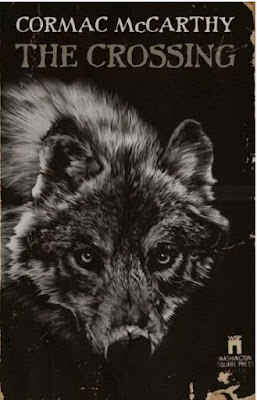I know exactly when and how I discovered McCarthy. In the early 1990s, I was volunteering, and later teaching, at a New York City youth centre called The Door. Another teacher there was reading All The Pretty Horses, which had just been published. The teacher, who was also an artist, named McCarthy as his favourite writer. It was a rave review, and I picked up the book.
The beauty of the language stunned me. In those days I read mostly fiction, and I hadn't come across any contempotary fiction that sounded like this -- spare, rhythmic, majestic, dark, brutal, unstinting in both violence and beauty. I heard echoes of Faulkner, but brought into a new world: Faulkner as McCarthy's literary grandfather.
Saul Bellow, another of my touchstones at the time, wrote of McCarthy's "absolutely overpowering use of language, his life-giving and death-dealing sentences". Reading McCarthy, I found myself re-reading certain sentences, saying them aloud, turning over the words, savoring and marveling at the beauty -- as I do when I read Shakespeare.
I went back to McCarthy's earlier work, and read Blood Meridian, Child of God, and Suttree, then bought and read The Crossing (1994) and Cities of the Plain (1998) as soon as they came out. Along with All The Pretty Horses, this is the Border Trilogy, a masterpiece of American fiction.
There are a few scenes in The Crossing, and one scene in particular, that I have never forgotten -- although I wish I could. Reading it hurt physically, a pain my chest like a heartbreak. To this day, it hurts to think about. I loved these books, but I hated the terrible pictures they put in my head. It's through McCarthy that I discovered that violence against animals is the one thing I cannot read about.
Then McCarthy stopped publishing for a while, and I forgot that he used to be one of my favourite writers.
Then came the two books that are said to be his masterpieces: No Country for Old Men (2005) and The Road (2006). I tried them both and could. not. read. them. The writing seemed like self-parody, the creepy darkness an overdone gimmick. It was if McCarthy decided to write a McCarthyesque novel. You want dark? I'll give you dark. You want gothic? I'll out gothic the gothic. I'll push all the Cormac McCarthy buttons, string them all together, and vomit the results onto the page. The critical raves baffle me.
I'm sad that these are his most famous works, and also mystified that they are considered his best. I may re-read the Border Trilogy to recall the tremendous beauty of his writing. It can't hurt any more than it already does.

7 comments:
"The Road" must have something going for it, right? It won the Pulitzer Prize for Fiction in 2007; it also won Britian's James Tait Black Memorial Prize for Fiction.
His last two books -- The Passenger and Stella Maris, both published late last year -- were described as the pinnacle of his career by Graeme Wood of The Atlantic. This week, Wood wrote: "The Passenger will be the book for which McCarthy is remembered, I suspect." (I am skeptical.)
McCarthy started writing The Passenger in the 1970s, working on it intermittently over the years. It was longlisted for the 2023 Andrew Carnegie Medal for Excellence in Fiction.
The Pulitzer Prize means something, like the National Book Award and the Booker Prize. I don't understand it.
"Pinnacle"? I am skeptical, too.
So nice to cross paths with you both today at the ceremony. I agree with your above comments and likewise struggle with our Canadian Historical "champion"...
https://www.google.com/url?sa=t&rct=j&q=&esrc=s&source=web&cd=&cad=rja&uact=8&ved=2ahUKEwjly9aGqsn_AhUCAjQIHYJQCF8QFnoECC4QAQ&url=https%3A%2F%2Fen.wikipedia.org%2Fwiki%2FGuy_Vanderhaeghe&usg=AOvVaw0bn9120DsdrUwk6S-E8Cpu&opi=89978449
Very nice -- and very surprising!!
How strange, in 10 years of Canadian librarianship, I have never come across Vanderhaeghe's name. I'm curious why that would be. I'll investigate.
Depending on how society advances (or devolves) in the next 100 years -- and if books still exist -- "The Road" might be thought of as McCarthy's most important work. The ever-shifting context in which his (and everyone else's) books are considered will determine which of them have lasting power and meaning.
If that's true, that will be a shame. The heartbreaking beauty of The Border Trilogy is unsurpassed.
But I'll give The Road another chance.
Also, 100 years from now, if the planet exists and if humans exist on it, books will exist, too. A bold prediction which I won't be around to see through!
Post a Comment